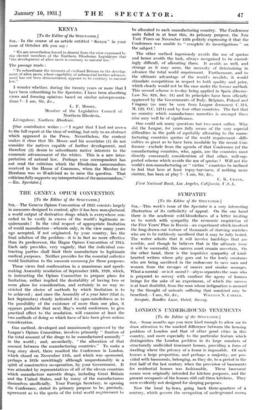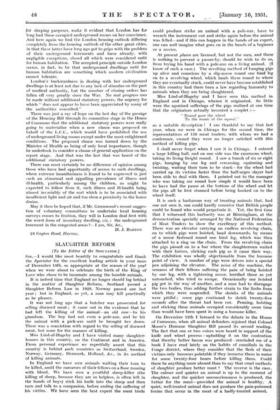LONDON 'S UNDERGROUND TEN Elf FATS
[To tlw Editor of the SPECTATOR.]
Sin,—Some months ago you were kind enough to allow me to draw attention to the marked difference between the housing problem of London and that of other great cities in this country, and more especially to the particular feature which distinguishes the London problem in its large numbers of structurally undivided tenement houses, providing a form of dwelling where the privacy of a home is impossible. Of such houses a large proportion, and perhaps a majority, are pro- vided with basements, belonging, as they do, to a period in the first half of the last century when the provision of basements for residential houses was fashionable. These basement rooms were originally intended for kitchen purposes, and the present occupants of the houses still call them kitchens. They were evidently not designed for sleeping purposes.
Now the local by-laws, going back three-quarters of a century, which govern the occupation of underground rooms
for sleeping purposes, make it evident that London has for long had these occupied underground rooms on her conscience. And here again we find the London housing outlook differing completely from the housing outlook of the other great cities, in that these latter have long ago got to grips with the problem of their underground tenements and . have already, with negligible exceptions, closed all which were considered unfit for human habitation. The accepted principle outside London seems, in fact, to be that underground dwellings unfit for human habitation are something which modern civilization cannot tolerate.
London's backwardness in dealing with her underground dwellings is at least not due to any lack of stimulus on the part of medical authority, but the number of closing orders has fallen off very greatly since the War. No real progress can be made without additional statutory powers, the urgency for which " does not appear to have been appreciated by many of the authorities consulted."
There was just a ray of hope on the last day of the passage of the Housing Bill through its committee stage in the House of Commons that the additional statutory powers were really going to materialize when a new clause was proposed on behalf of the L.C.C., which would have prohibited the use of underground living rooms except under the most enlightened conditions. The proposed clause was turned down by the Minister of Health as being of only local importance, though lie undertook to consider a clause of general application on the report stage. And that was the last that was heard of the additional statutory powers.
There can most certainly be no difference of opinion among those who have had opportunity of access to such dwellings, where extreme insanitariness is found to be expressed in just such an abnormal and appalling prevalence of illness and ill-health, particularly among the children, as might be expected to follow from it, such illness and ill-health being almost invariably of the sort which is to be associated with insufficient light and air and too close a proximity to the house drains.
May it then be hoped that, if Mr. Greenwood's recent sugges- tion of voluntary committees to undertake local housing surveys comes to fruition, they will in London deal first with the worst form of insanitary dwelling, viz.: the underground tenement in the congested areas ?—I am, Sir, &c.,



































 Previous page
Previous page